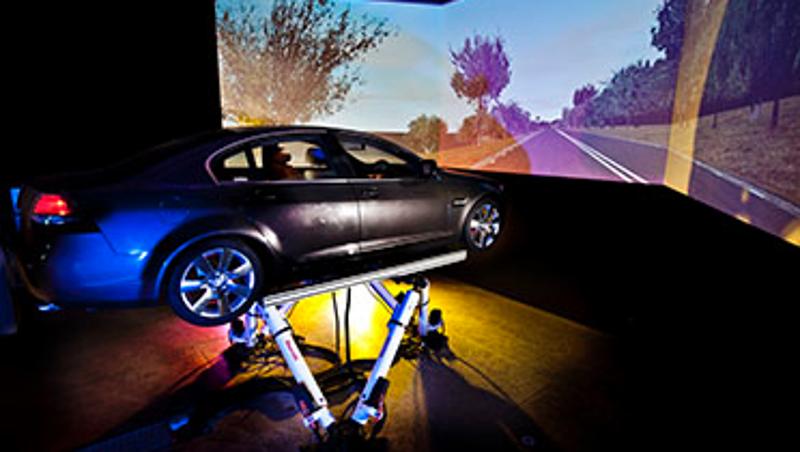
Queensland University of Technology researchers are studying some of the most dangerous driver behaviours in challenging driving conditions, all in the off-road safety of a new $1.5 million driving simulator.
Launched at QUT's Centre for Accident Research & Road Safety - Queensland (CARRS-Q), Australia's most advanced driving simulator provides cutting-edge technology to study human behaviour in different driving conditions.
CARRS-Q director Professor Barry Watson said road crashes were, tragically, still a major cause of traumatic death and injury in Australia with an economic and social burden estimated at more than $17 billion a year.
"This state-of-the-art facility enables road safety researchers to study what would otherwise be logistically, practically and ethically difficult to do out on the open road," Professor Watson said.
"For example, driver fatigue is recognised as one of the "fatal four" crash causes on our roads. But to determine the impact of sleep loss on driving behaviour is difficult because it is unsafe to deprive people of sleep and then put them behind the wheel under real driving conditions.
"The driving simulator allows us to study drivers in safety-critical situations with a high degree of realism, while being in a protected environment."
Professor Watson said the key features that made the driving simulator unique included being able to replicate real-time traffic conditions, reproduce sensor and warning systems and allow researchers to manipulate driving environments.
"By recreating common yet potentially dangerous driving environments using simulation technology we can study how different people respond," he said.
"This gives us a greater understanding of driver behaviour under difficult conditions which allow us to develop improved prevention strategies, thereby making our roads safer.
"Over the past 20 to 30 years we've had great success in reducing the nation's road toll, but more recently our efforts have slowed and even plateaued.
"This simulator offers a breakthrough in better understanding driver behaviour, in order to reduce the death toll on Australian roads."
Professor Watson said the simulator had already been earmarked for a number of research projects including a study on improving safety at railway crossings and understanding the impact of whiplash on driver performance.
But he said it could also be used to measure the impairing effect of drugs, alcohol and distraction on driver performance as well as determine triggers which might prompt driver aggression.
"The research opportunities are limitless," he said.
The driving simulator works by utilising eight computers, projectors and a platform capable of moving in three dimensions. It incorporates a real Holden Calais vehicle allowing the simulator to recreate realistic traffic situations.
The simulator has been funded by the Australian Research Council, QUT, the University of Queensland, Queensland Department of Transport and Main Roads, RACQ, the Motor Accident Insurance Commission and General Motors Holden. It brings together researchers from fields including psychology, road safety, optometry, mathematics and physiology.
CARRS-Q is also a member of QUT's Institute of Health and Biomedical Innovation.
Media contact:
Rose Trapnell, QUT media team leader, 07 3138 2361 or rose.trapnell@qut.edu.au




